Have you ever imagined your diet being tailored to your DNA? That a mobile app could be a better nutritionist than a seasoned specialist? That saving food from being thrown away could be as simple as one click?
Welcome to the era of FoodTech, where AI-powered systems and innovative solutions converge to reshape the food industry. Artificial intelligence is now deeply integrated across the entire food supply chain-from food production and food processing to food delivery platforms-bringing real-time data-driven insights, personalized experiences, and sustainable operations. Whether it's optimizing inventory management, enhancing customer satisfaction, or improving production efficiency, AI is revolutionizing every bite.
Top AI Use Cases in Foodtech
AI is rapidly reshaping the foodtech landscape, enhancing how consumers make decisions, how businesses operate, and how products are developed. With advanced models capable of interpreting health data, analyzing ingredients, and adapting to real-time contexts, AI is moving far beyond simple recommendations.
1. Nuuro: The Swiss nutritionist in your pocket
Let’s begin with an example that illustrates how AI models can transform personalized nutrition. Nuuro, a Swiss app, harnesses machine learning algorithms to analyze health data, dietary preferences, food intolerances, and individual goals. This AI-powered platform supports tailored recommendations using consumer data and natural language processing, delivering advice as precise as a personal nutritionist.
What sets Nuuro apart is its integration of food safety, medical profiling, and consumer preferences. Whether you're managing diabetes or autoimmune conditions, Nuuro interprets complex biological markers and production parameters to guide daily choices. Going out for dinner? The app cross-references menu items with your user preferences using real-world scenarios. At the store? It uses computer vision algorithms to flag items you should avoid.
2. Zoe: Revolutionizing metabolic monitoring
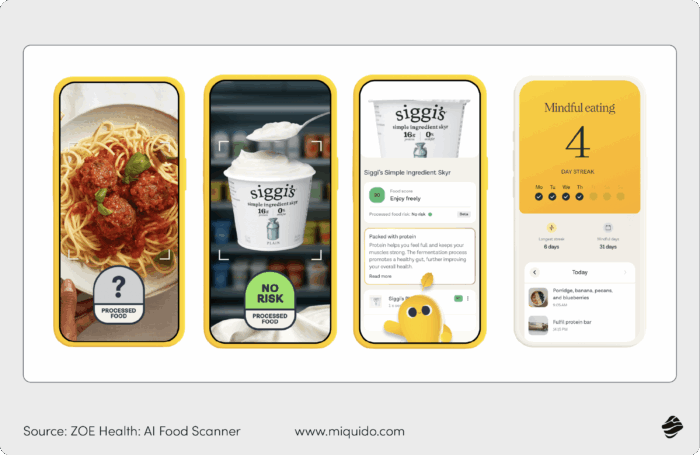
The Zoe program, co-developed by epidemiologist Tim Spector, merges a mobile app with home test kits and sensor data to monitor metabolic reactions. It incorporates smart muffins, blood tests, glucose sensors, and gut microbiome kits to collect detailed biological inputs. Zoe then applies AI systems trained on labeled data to produce a personalized nutrition score (0–100) for each food item.
Using historical data, Zoe can identify seasonal trends, forecast blood sugar spikes, and tailor dietary plans to your consumer behavior. By leveraging machine learning models and data-driven insights, Zoe showcases how food companies can optimize customer experience and increase customer satisfaction through ultra-personalized health interventions.
3. Too Good To Go: A global food-saving revolution
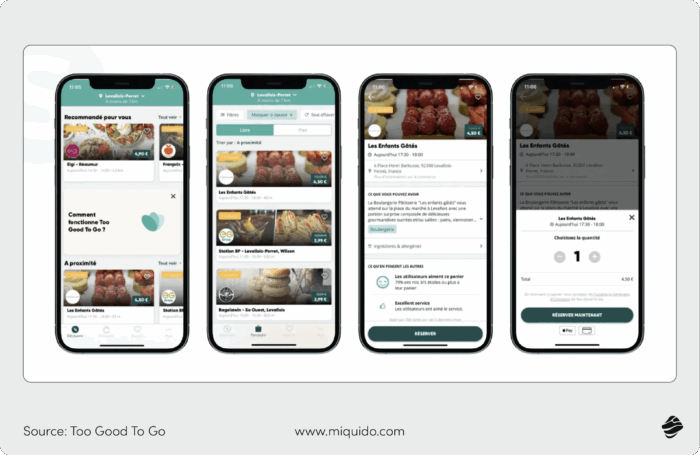
Food waste represents one of the greatest inefficiencies in the food supply chain. Every year, massive volumes of food are discarded, despite high customer demand and global hunger. Enter Too Good To Go, a leading AI-powered food delivery platform that connects food surpluses with consumers in real-time.
This platform helps multiple companies better manage excess inventory and improve operational efficiency through demand forecasting and rapid response tools. With over 100 million users, Too Good To Go exemplifies how AI technology can enable waste reduction while maintaining high customer satisfaction and seamless food delivery.
4. OLIO: Community-based food sharing
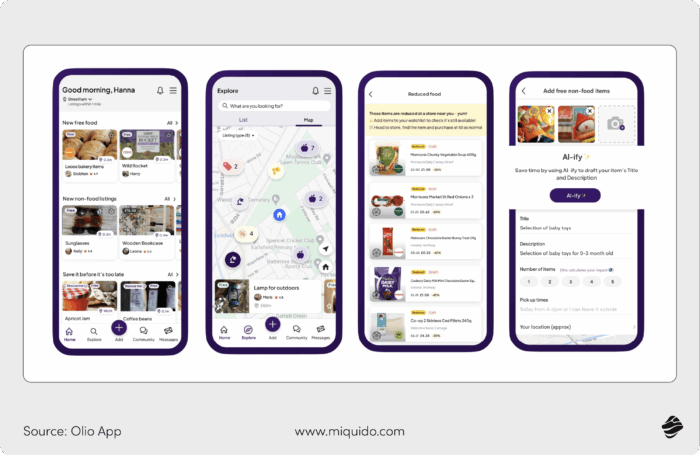
Operating on a decentralized model, OLIO applies AI to connect neighbors for hyper-local food redistribution. The app utilizes AI algorithms and consumer data to match surplus items with users based on proximity, customer preferences, and market demands.
By optimizing inventory management at a household level and facilitating smart supply chain micro-interactions, OLIO supports both food security and labor supply challenges in urban environments.
5. HelloFresh: AI in meal kit personalization and supply chain optimization
HelloFresh, one of the world's largest meal kit providers, leverages AI across multiple layers of its operations, from personalized meal suggestions to supply chain efficiency. The app integrates consumer data, recipe preferences, and historical purchase behavior to curate weekly meal kits tailored to individual tastes and dietary needs.
What makes HelloFresh noteworthy is how it transforms complex logistics into a frictionless customer experience. Behind the scenes, AI-powered forecasting models optimize ingredient procurement and packaging, minimizing food waste and reducing carbon emissions. Their algorithms anticipate customer preferences, manage inventory with precision, and adapt to market demands in real time.
By applying machine learning to everything from menu planning to fulfillment scheduling, HelloFresh showcases how AI in food delivery isn't just about convenience, it's about synchronizing sustainability with customer satisfaction at scale.
6. Vytal: Deposit-free system
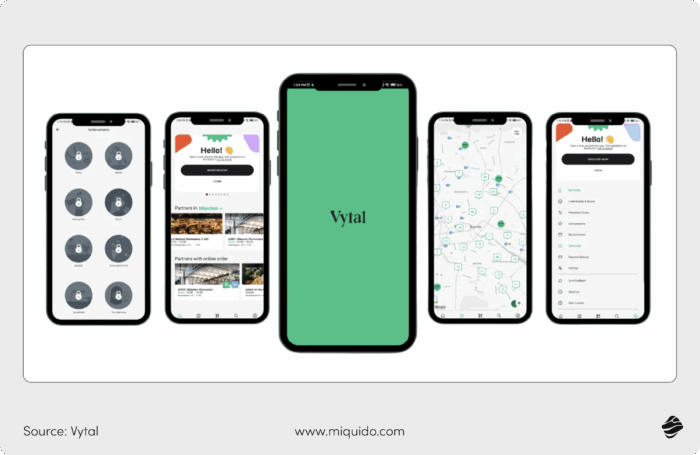
Disposable containers create both environmental and supply chain burdens. Vytal, a German solution, integrates AI-powered systems into a reusable container network. With no deposit required, users borrow containers via QR scan, and the system tracks returns across partner locations.
Vytal’s AI platform uses production planning data and return metrics to optimize logistics, enhance production efficiency, and meet complex relationships between container use and customer behavior. The Tap2Borrow feature-borrowing with just a card-improves customer experience by simplifying engagement.
Kitchen tech: From IoT to the future of fermentation
The IoT kitchen
The restaurant industry and home cooking are both undergoing a tech revolution. Devices like Thermomix and June Oven integrate AI technology, computer vision, and sensor data to automate cooking tasks. These devices optimize temperature, timing, and recipe sequencing, streamlining production processes.
Smart fridges and Bluetooth thermometers enhance quality control, ensure food safety, and provide real-time feedback. As intelligent appliances gather more consumer data, they will also aid in predicting equipment failures and reducing human error in both domestic and commercial kitchens.
Fermentation 2.0
In the realm of food processing and food manufacturing, startups like Formo and Revo Foods are applying AI algorithms and intelligent systems to monitor and manage production parameters during fermentation. Their systems use sensor data to optimize alternative protein creation-from cow-free cheese to plant-based salmon.
These examples underline how AI enables production efficiency, guarantees food safety, and helps meet consumer preferences for ethical, plant-based food products.
Global inspiration vs. local flavor
The DACH region demonstrates how regional contexts can shape the implementation of AI across various industries within the food supply chain.
- In sustainable FoodTech, apps like Too Good To Go have scaled globally based on consumer feedback and historical data gathered in local markets.
- In personalized nutrition, startups like Nuuro bring AI-powered solutions grounded in local dietary preferences and languages.
- In IoT and fermentation, the region excels at adapting smart devices and AI-enhanced bioprocessing to both industrial and consumer-facing solutions.
Top 5 industry segments where mobile apps and smart technologies are shaping the future of foodtech
The application of AI in FoodTech goes far beyond personalized diets or fighting food waste. Equally transformative is how AI-powered systems are now integrated into mobile apps tailored to specific sectors of the food industry-from retail chains and grocery stores, to food delivery platforms, distributors, and fitness-oriented catering services.
1. Retail chains and grocery stores
In a world where inventory turnover, customer loyalty, and shopping experience define competitiveness, AI is turning mobile apps into command centers for modern food companies.
- Demand forecasting: Advanced machine learning models analyze historical sales data, seasonal trends, promotions, and external variables to optimize inventory management, reducing overstock and shortages by up to 40%.
- Personalized offers in the app: AI algorithms power recommendation engines that generate custom coupons and product suggestions based on consumer behavior, boosting conversions by up to 25%.
- AI ETA and delivery tracking: Real-time delivery time prediction algorithms improve customer satisfaction by up to 30%, adjusting dynamically based on road conditions and logistical complexity.
- Intelligent loyalty systems: Gamified, dynamic loyalty programs tailored to user preferences increase retention by 35% and purchase frequency by 20%.
Benefit: Enhanced customer experience, improved supply chain efficiency, and reduced losses.
2. Food delivery platforms and foodtech startups
For companies operating in the on-demand food delivery space, speed, quality, and retention are everything. AI-powered platforms offer a competitive edge.
- Dynamic routing of delivery drivers: AI systems that calculate optimal routes in real time-considering traffic and priority-cut fuel costs by 15% and delivery time by 20%.
- Computer vision technology for quality control: AI identifies damaged packaging and incorrect labels via image recognition, decreasing complaints by up to 35%.
- AI chatbots: Provide 24/7 customer service, resolving up to 70% of typical issues without human support.
- Churn prediction: AI models detect patterns in consumer data to forecast and prevent churn with personalized offers, preserving customer lifetime value.
Benefit: Reduced customer complaints, faster service, and higher customer retention.
3. Food distributors and wholesalers
In the B2B segment, precision, forecasting, and minimizing waste define success. Here, AI platforms bring data-driven optimization across every link of the food supply chain.
- Supply chain optimization: AI-driven production and transport planning tools take into account variables such as weather, vehicle availability, and customer priority, enhancing operational efficiency.
- Order Prediction: Algorithms trained on historical data and market trends achieve up to 92% accuracy in predicting volumes.
- Compliance Automation: AI systems validate labels, certifications, and documents, reducing error risk by 78%-supporting food safety and regulatory compliance.
Success Story: Kollex transformed supplier relationships in HoReCa by introducing an AI-powered platform that automates orders, optimizes deliveries, and cuts administrative costs by 32%.
4.Bakeries and small food service outlets
Small food service businesses can also benefit from AI technology-without the need for a complex IT infrastructure. Affordable mobile solutions now empower even the smallest players.
- AI production planning: AI systems trained on sales data help prevent overproduction and reduce bread waste by up to 45%.
- Mobile inventory management: Real-time inventory tracking via mobile apps boosts staff efficiency by 25%.
Waste Analysis: Smart tools analyze food waste and suggest operational improvements, leading to 35% waste reduction. - Voice ordering systems: Voice-enabled ordering speeds up service by 40% and cuts ordering errors by 60%.
Benefit: Boosted production efficiency, less waste, and simplified operations.
5. Fitness & wellness companies with catering services
In the health and wellness sector, personalization is essential. With AI, fitness apps and healthy catering solutions form a cohesive, data-driven ecosystem tailored to each user.
- Personalized diets: AI models optimize meals based on clients' health goals and activity levels, increasing program effectiveness by 40%.
- Integration with wearables: Real-time synchronization with fitness trackers and smartwatches adjusts meal plans according to actual energy expenditure.
- Smart shopping lists: AI-generated grocery lists aligned with meal plans save users up to 3 hours per week-integrating seamlessly with e-grocery platforms.
- Gamification and rewards: AI personalizes challenges and bonuses to align with consumer preferences, increasing engagement by 65%.
Example: Freeletics integrated an AI-driven meal planner into its fitness app, achieving a 78% increase in premium subscription retention and a 45% boost in catering orders.
The future of foodtech apps
The next wave of innovation in FoodTech will be driven by mobile experiences that are not just smart, but deeply integrated with operations, logistics, and user behavior. While AI continues to power demand forecasting and hyper-personalized nutrition, the real game-changer lies in how these technologies are delivered to users - seamlessly, scalably, and reliably.
At Miquido, we help FoodTech companies, grocery chains, and meal kit providers turn vision into scalable digital products - from frictionless ordering flows and self-service apps to internal tools supporting logistics, supply chain and quality control. Whether it's launching a new m-commerce channel, modernizing a legacy platform, or building a fully integrated ecosystem of mobile apps - we specialize in delivering enterprise-grade mobile solutions that are ready to grow with the business.
What tomorrow's FoodTech apps demand - and how we deliver:
- Predictive, personalized, and transactional: We build mobile platforms that combine AI-driven personalization with high-converting UX and robust e-commerce infrastructure.
- From click to fulfillment: We create apps for end-users and operations alike, integrating with ERP, logistics and production systems to shorten time-to-market and improve operational efficiency.
- Cross-platform, scalable, future-ready: Our teams specialize in Kotlin Multiplatform and Flutter, helping brands reduce time to market, modernize legacy apps, and consolidate fragmented experiences into a single mobile-first interface.
- Beyond front-end: We don’t just build the app, we deliver backend architecture, data integrations, gamification mechanisms, and self-service logic that keep users engaged and businesses agile.
In a market where demand prediction, user preferences, and delivery precision shape competitive advantage, we make sure the technology underneath is as intelligent and resilient as the experience it powers.
From superapps for food retailers, to self-service apps for food production teams, to loyalty and subscription platforms — we help build the digital backbone of next-generation FoodTech.

![[header] ai in foodtech and food delivery resolving key industry challenges with mobile apps](https://www.miquido.com/wp-content/uploads/2025/08/header-ai-in-foodtech-and-food-delivery_-resolving-key-industry-challenges-with-mobile-apps.jpg)
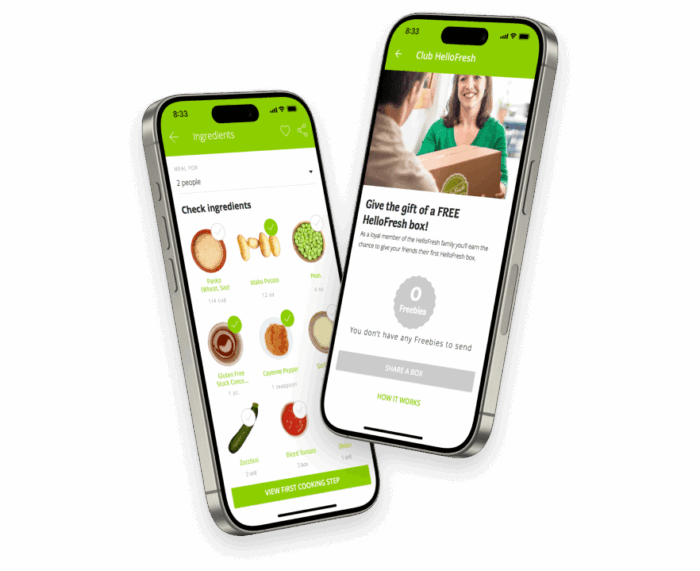


![[header] top ai fintech companies transforming finance in 2025](https://www.miquido.com/wp-content/uploads/2025/05/header-top-ai-fintech-companies-transforming-finance-in-2025-432x288.jpg)



![[header] top generative ai companies in 2025 min](https://www.miquido.com/wp-content/uploads/2025/09/header-top-generative-ai-companies-in-2025-min-432x288.jpg)
